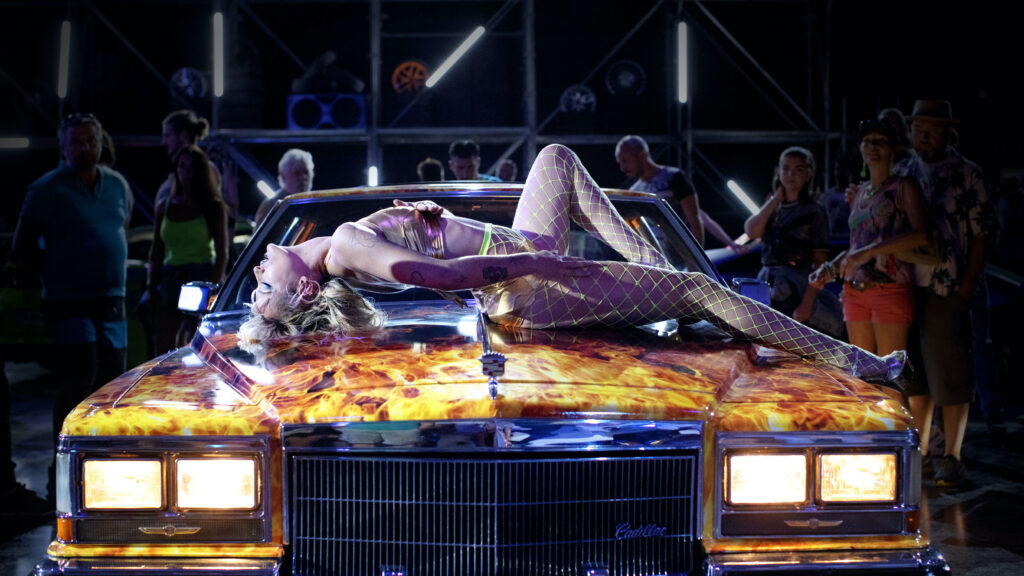French director Julia Ducournau has created a neo-surrealist masterpiece that combines ten bizarre stories in the tale of a woman who gets pregnant by a car.

Last year’s Cannes Film Festival saw a triumph for the agent provocateur – not the Mike Ashley-owned lingerie brand; even if he did have a biopic it would probably be more Toad of Toad Hall than Wolf of Wall Street. The enfant terriblein this case was French director Julia Ducournau, who became the second woman to win the Palme d’Or for Titane, the petrol-charged follow-up to her 2016 debut Raw. Both films allegedly caused faintings, vomitings and walk-outs at Cannes, though claims of such nature should probably be taken with a pinch of asphalt. This is the festival where a single luxury hotel can expect to serve 19,000 bottles of wine and two tonnes of lobster over the course of 12 days, so a screening of Herbie Goes Bananas may have provoked a similar reaction.
That said, Titane is deeply unsettling on both mind and stomach. Ostensibly the story of a woman (Agathe Rousselle) who has sex with a car and gets pregnant, Ducournau treats the illogical premise with such form and feeling that you believe every breathtaking development. Not so much a bizarre film as 10 bizarre films in one, it straddles genres, moods and themes with a sense of control missing from the Hollywood hokum served up by Ari Aster and Jason Blum. Instead of formless riffs on old tropes, Ducournau tells fiercely original stories that make you think, feel and squirm. The performances are faultless, imbuing the characters with the humanity required to navigate so much uncharted terrain. Rousselle’s commitment would be astounding in any case, but knowing this to be her first feature is one of many jaw-dropping elements in a movie that makes a strong case for having jaw-wiring devices underneath the seats.
Tempting as it is to reduce Titane’s hydraulic complexity to its references (Christine meets Crash; Under the Skin by way of New French Extremity), those comparisons fall apart whenever Ducournau changes direction, as she does in every scene. Each sequence introduces some new act of transgression or violation, none of it gratuitous, all at the service of Alexia’s story. It opens on the car crash that leaves her with a titanium plate surgically implanted in her head, then sends her on a murderous rampage in a scene Quentin Tarantino could only dream of making at this point in his career. But Ducournau has no interest in audience gratification, and swaps the black-comic brutality for an intimate, surprisingly touching second half in which Alexia goes on the run disguised as a boy.
There is one sequence on a bus where Alexia observes some sexual harassment, which plays out in opposition to an identical scene from the 2021 action movie Nobody. Her refusal to conform to type or expectation is precisely why we empathise with her, a character so believable that we constantly forget she is pregnant with a car – at least until the next whiplash-inducing reminder. And while it may be the fantastic premise that initially hooks the audience, it is the emotional reality that ultimately compels us. When Alexia is taken in by a firefighter (Vincent Lindon) believing her to be his missing son, Titane subverts our expectations yet again; by having Vincent quickly realise Alexia is not his son, Ducournau eschews the generic thriller questions of when and how he will find out, in favour of more interesting inquiries into what he wants from her and why.
As in Raw, Ducournau is interested in puncturing the traditional family; something alien infiltrating the domestic unit, be that cannibalism or transhumanism, the merging of human and machine previously explored in body horror by David Cronenberg and the Soska Sisters. Vincent and Alexia’s bonds are forged in the titanic clash of metal and fire, caring for each other without the judgement or interrogation of society’s prying eyes. The unlikely pair traverse every familial relationship, often at the same time, shattering the domestic structure along with conventional notions of sexuality and gender. That collision of fuel and family is almost an inverted Fast & Furious, taking its “found family” dynamics to extreme conclusions. Along the way it toys with contemporary themes of queerness, belonging and finding one’s tribe; the characters exist outside of societal norms and established roles, yet together they usher in something new.
The dramatic and thematic tension is matched by Ducournau’s searing style, continuing Raw’s sickly neon glow and stomach-churning score, courtesy of returning cinematographer Ruben Impens and composer Jim Williams. Pop music and dance sequences also form key plot points, including She’s Not There by The Zombies and even the Macarena, adding to the movie’s warped sense of humour. The sound of straining gears and body tape rev up the atmosphere, the special effects an oily vision of otherness made flesh. There are some brilliantly choreographed kills, but it is the dread that stays with you. A scene where Alexia breaks her own nose as part of her disguise is particularly hard to watch, not so much for the act of violence as the build-up; the horror arises from the way Ducournau tells us what is about to happen.
An engine of internal logic keeps all this combustible weirdness ticking over, fused together by Ducournau’s assured and sustained mood, never taking her foot off the gas from the writhing opening through to the transcendent climax. By the end you may not know what you have just watched, but you will certainly never forget it. Titane is unique, incendiary and defiant in the face of convention and explanation; a fender-, gender- and genre-bending triumph that puts the “hood” in motherhood.
Dan Meier is a freelance writer, editor and critic based in London.







